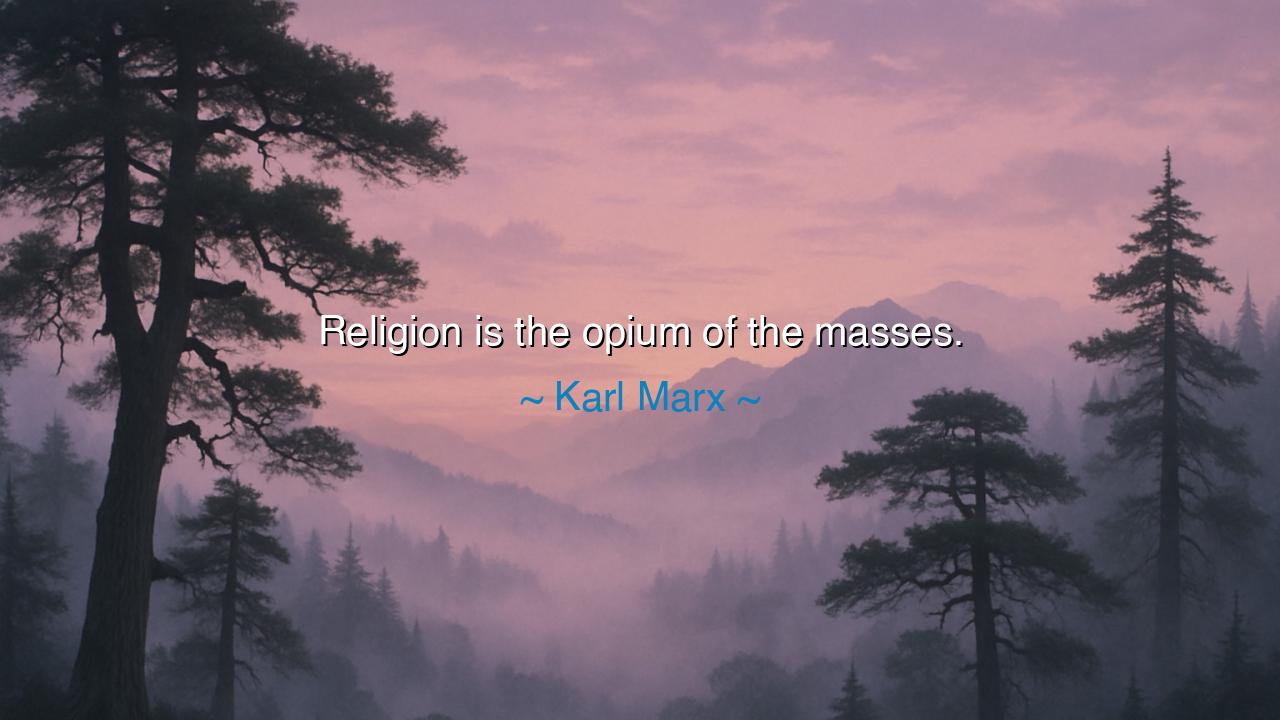
Religion is the opium of the masses.






When Karl Marx declared, “Religion is the opium of the masses,” he uttered words that would echo across centuries — words both profound and misunderstood. In them lies not mockery of faith, but a lament for human suffering and a cry for awakening. Marx, the philosopher of revolution, saw religion as both a balm and a chain — a comfort for pain, yet also a veil that hides injustice. His words burn with compassion for the downtrodden, for he saw in religion the sigh of a wounded soul, the tender illusion that softens misery but does not end it.
The origin of this quote lies in Marx’s early writings, particularly his Critique of Hegel’s Philosophy of Right (1843). Europe was then a continent of kings and poverty, where the poor bent under the weight of labor while the powerful claimed divine right. The Church, bound to the state, often urged patience and obedience, teaching that suffering on earth would be rewarded in heaven. Marx saw in this a tragic paradox: that faith, meant to uplift the soul, had become a drug that dulled the mind. Religion soothed the oppressed with promises of eternity, while their oppressors enjoyed the spoils of the present.
To call religion an “opium” was, in Marx’s time, to invoke the image of medicine — for opium was not merely a vice, but a cure for unbearable pain. Thus, his statement carried both sorrow and admiration. He recognized that religion heals, that it gives solace to the heart crushed beneath despair. But like opium, its comfort comes with a price: it can lull the sufferer into acceptance, numbing the will to rise and change the world. For Marx, the higher calling of man was not to escape suffering through illusion, but to conquer it through action.
To understand this, we must see his world — the grim factories of the Industrial Revolution, where children toiled beside their parents, and hunger was a daily prayer. In that smoke-choked darkness, preachers often told the poor to “bear their cross,” to find meaning in obedience and endurance. Marx did not despise their faith; he despised the system that required it. He saw religion as the sigh of the oppressed creature — sacred, yes, but born from sorrow. And he believed that humanity could build a world where such sighs were no longer needed, where the balm of heaven could be replaced by the justice of earth.
History bears witness to this tension. Consider the story of the peasants of medieval Europe, who labored endlessly under the rule of lords and priests. The Church, intertwined with power, often told them that rebellion was sin, that humility would earn paradise. And so, with hope as their only treasure, they endured centuries of hardship. Yet, among them, voices of awakening began to rise — the mystics, the reformers, the prophets who cried that the divine did not dwell only in cathedrals, but in the dignity of every human being. In their courage, Marx saw a different kind of faith — not one that sedates, but one that liberates.
But Marx’s vision, though noble in intention, was not without peril. For in rejecting religion entirely, some of his followers sought to erase the sacred altogether, forgetting that even revolution needs a soul. True freedom, as the wise have said, is not born of destruction alone, but of compassion — of building a world where justice and meaning dwell side by side. Thus, the modern reader must take Marx’s words not as a command to cast out faith, but as a summons to awaken it — to transform it from an opiate into a force of truth and courage.
The lesson, therefore, is this: do not seek escape from pain in illusions, however sweet. Let your belief, whatever its form, drive you to act, to lift the fallen and challenge injustice. Do not use faith to numb yourself to the suffering of others; use it to heal that suffering. True religion is not the opium that puts men to sleep, but the fire that wakes them to compassion and purpose.
So, my child, when you hear Marx’s words, do not hear hatred — hear longing. He longed for a world where men would no longer need illusions to endure life, because life itself would be made just. Let that longing stir your spirit. Live awake. Let your heart hold both faith and reason. And remember always: the goal is not to destroy the dream, but to make it real — to build a world where heaven need not be promised, because it has already begun on earth.






AAdministratorAdministrator
Welcome, honored guests. Please leave a comment, we will respond soon